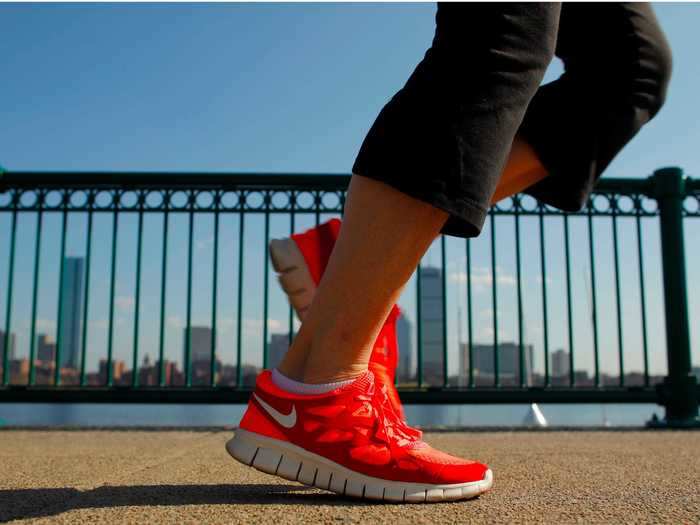Dealing with anxiety doesn't have to mean you can't work effectively.Maskot/Getty Images
- Sixty-eight percent of Americans report moderate to high levels of work-related stress, according to a 2018 survey from tech company Wrike.
- Dealing with stress at work is even more difficult for people diagnosed with anxiety.
- How can people with anxiety manage work? Marla Deibler, a licensed clinical psychologist, says that above all, people with anxiety shouldn't limit themselves.
- Other ways to manage anxiety include practicing mindfulness and pushing yourself to connect with others.
- Click here for more BI Prime stories.
Work-related stress is anything but uncommon.
Some 68% of Americans report experiencing moderate to high levels of stress on the job, according to a 2018 survey from tech company Wrike.
Navigating the workplace can be even more difficult for individuals dealing with anxiety. In fact, anxiety, along with often co-occurring depression, is a leading cause of disability, research shows.
So what can someone with anxiety do to help themselves be more comfortable at work?
Read the original article on
Business Insider
11. Seek professional help.
Cognitive behavioral therapy may be helpful if you are struggling with anxiety.
wavebreakmedia/Shutterstock
Remember, you don't have to go this alone.
"Sometimes anxiety can be difficult to manage without professional help," Deibler says. "A clinical psychologist who provides cognitive behavioral therapy can assist individuals in learning to better understand anxiety and change their relationship to their anxious thoughts and feelings. Concerned coworkers and employers might also choose to express their concern for a colleague and help to normalize the experience and encourage the individual to seek help."
10. Stay connected.
If you have five minutes, give a family member or friend a call.
fizkes/Shuttestock
You can get by with a little help from your friends.
"Social support is vital to managing stress," Deibler says. "Maintain connections to family and friends. Talking with others can do a world of good."
9. Lay off the coffee.
Caffeine, a stimulant, can make you jittery and uncomfortable.
Katie Warren/Business Insider
When it comes to managing anxiety, that latte in the morning is not your friend.
"Keep caffeine consumption to a minimum, as it can increase heart rate and physiological symptoms of anxiety," Deibler says.
8. Try progressive muscle relaxation.
Taking a few minutes during your work day to stretch or practice diaphragmatic breathing can help.
Dean Drobot/Shutterstock
Engage in exercises that relax your body and set your mind at ease.
"Diaphragmatic breathing or other relaxation inducing practice (e.g., mindfulness meditation, progressive muscle relaxation, guided imagery exercises, tai chi, yoga) can reduce stress by helping to encourage the relaxation response."
7. Take a break.
Getting some outdoor time can help relax your mind.
Dan Kitwood/Getty Images
Deibler notes that changing your pace or scenery from time to time actually helps with managing anxiety.
6. Remind yourself that your mind is not always the best advisor.
Talking through your thoughts with a trusted friend or therapist can help.
Getty Images
Sometimes, you can't trust yourself.
"Our minds like to constantly tell stories, analyze, judge, give advice, and criticize," Deibler says. "Sometimes these thoughts are supremely unhelpful to us. Observe what your mind does. Notice the thoughts. Note that they are not objective truths. You get to decide whether the thoughts are worthy of your attention."
5. Practice self-care.
Working out is a great way to relieve stress.
Brian Snyder/Reuters
Don't forget to take care of yourself.
"Attend to your own feelings and healthy lifestyle practices: good nutrition, sleep, and exercise are important to well-being, resilience, and healthy stress management," Deibler says.
4. Invite anxiety along for the ride.
Try pushing yourself outside of your comfort zone.
Fizkes/Shutterstock
Confront your anxieties head on. If you're nervous about public speaking, join a club to improve your skills. If you're afraid of talking to your coworkers, try to strike up a conversation.
"Push yourself to enter situations that lead to anxiety in order to demonstrate to yourself that you can persevere and succeed despite anxiety," Deibler says. "Exposing yourself to anxiety provoking situations, rather than avoiding them, helps to change your relationship to anxiety and increase your confidence in these situations."
3. Be mindful.
Practicing mindfulness can help you overcome moments of panic.
Oliver Rossi/Getty Images
Check in with yourself once in a while.
"Examine anxiety with curiosity when it shows up, rather than rejecting it," Deibler says. "What do you notice when it shows up? What are you thinking and feeling?"
2. Don't suppress your anxiety.
The next time you feel anxious, try practicing acceptance.
Rawpixel.com/Shutterstock.com
Stifling your feelings is counterproductive.
"Everyone experiences anxiety," Deibler says. "It is a normal response to stress. Let it in when it shows up. Practice acceptance. Rather than trying to push it away (which tends to be futile, resulting in feeling more overwhelmed and less in control), make room for anxiety. It is showing up to try to bring your attention to something."
Deibler says that, by allowing space for some anxiety at work, you'll render it less bothersome in the long run.
1. The most important thing is to not change the way you live.
Those with anxiety shouldn't fear living, licensed clinical psychologist Dr. Marla Deibler says.
Shutterstock/tommaso79
Above all, people with anxiety should avoid limiting themselves, according to Marla Deibler, licensed clinical psychologist and the founder of The Center for Emotional Health of Greater Philadelphia.
"Those who struggle with anxiety should strive to fully participate in life, despite their bodily experience of anxiety — anywhere at anytime," Deibler says. "Being willing to fully experience themselves and their private experiences (thoughts, feelings, physical sensations, etc.) and being accepting of that range of experiences, while continuing to act on with what is important to them, will lead them to in the direction of ceasing the struggle with anxiety."
Deibler provided Business Insider with some other crucial tips — from symptom management strategies to changing your entire mindset — for handling anxiety in the workplace.











